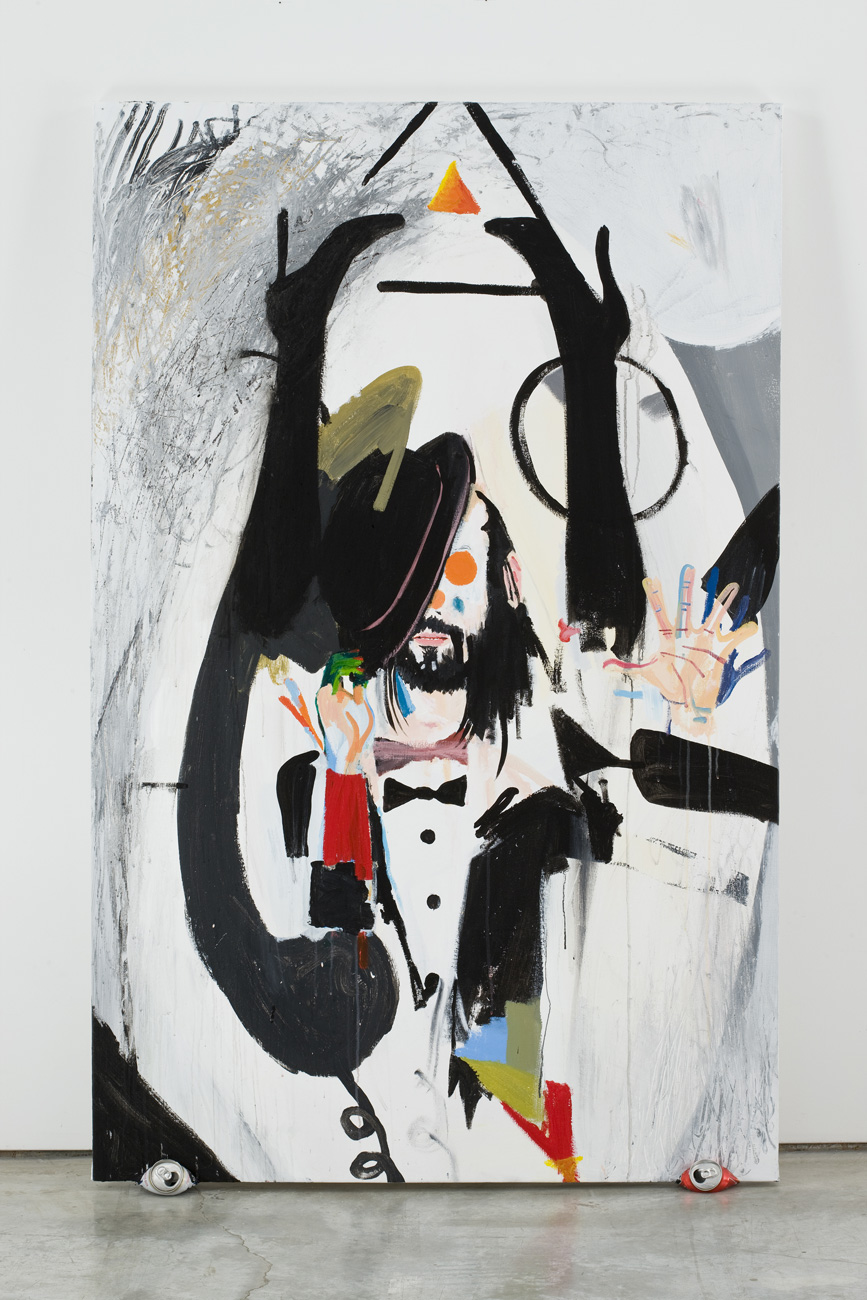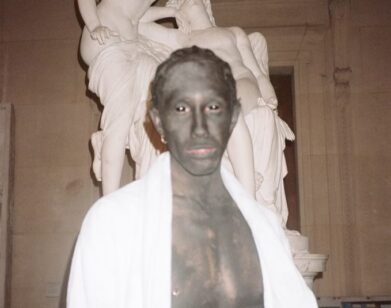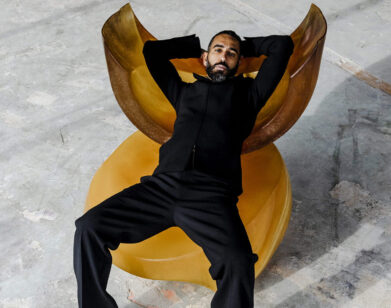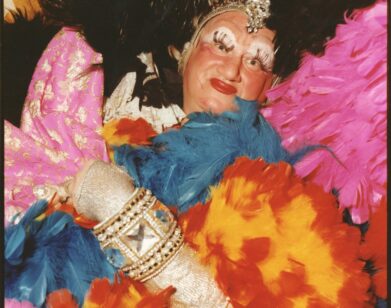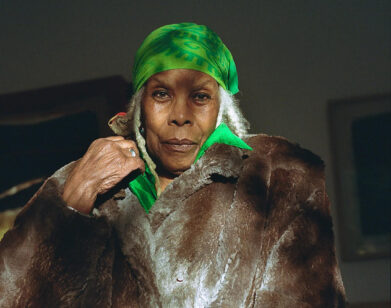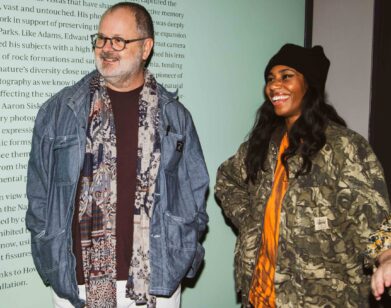Spencer Sweeney
In some future museum devoted to downtown New York City, there will be a wing dedicated to the messy conflation of art, rock ’n’ roll, and nightlife in the 1990s and 2000s, as well as a golden, life-size statue of Spencer Sweeney, the 36-year-old artist, musician, DJ, club owner, and playboy mystic of the land below 14th Street, at the entrance to welcome guests. For the last 13 years, Sweeney has had his hands in so many pockets of downtown, it is hard to find one that doesn’t have some sort of association with him.
He was a regular at the late gallerist Colin de Land’s mainstay, American Fine Arts, in the ’90s and the drummer for the influential art-rock band Actress alongside Gang Gang Dance’s Lizzi Bougatsos, and is now a DJ, curator, and artist at Gavin Brown’s Enterprise. His paintings tend to possess an air of comic-book mythology, evocative and violent and troubled and teeming with hope. If you’ve moved to New York in the last decade in search of -creative -bohemia, there is a good chance that Sweeney deejayed at a party you attended, an equal chance you danced at Santos Party House—the club he co-owns with Andrew W.K., Ron -Castellano, and Larry Golden—and a slim but not utterly impossible chance that you got drunk in his apartment at one of his popular monthly pay-the-rent rooftop parties.
As a new decade has dawned on New York with fewer pockets of imagination than anyone expected, Sweeney seems to be providing his own high-energy source in a series of experimental and experiential art shows. Last December he installed his studio in Gavin Brown’s gallery, filling it with color, props, and paintings, and engineered a rock opera and performances by special acts that included the members of A.R.E. Weapons and old friend Andrew W.K. Sweeney is bringing that all-over show to -Berlin this spring and is returning to New York this month to unleash a series of self-portraits that he has been creating since 1990. Some are celebratory, some rather grim, but even the artist himself couldn’t depict all of his many sides. Here, Sweeney talks to one of his early New York discoveries, Andrew W.K., about the pleasures of staying up all night and why the dreams of youth might be the best things you’ll ever own.
ANDREW W.K.: Thank you for inviting me to interview you.
SPENCER SWEENEY: You were my first choice.
W.K.: I thought about who my first choice would have been, and it wouldn’t have been me.
SWEENEY: I thought you were going to say, “And it wouldn’t have been you.”
W.K.: No, I didn’t even think that far. I meant that I wouldn’t want me to interview myself. But anyway I just wanted it on the record that it’s nice that you picked me, because if anyone ever really first discovered me, it was you. A friend of yours saw the first show I ever played in New York, and you took it upon yourself to introduce me to your friends and family and invite me to play at Gavin Brown. And I just played again at Gavin’s during your last show there, so that completes a circle. It was such a privilege. I would use the word “honor,” but when I met Lucas Samaras and told him it was an honor to meet him, he told me that there was no such thing as “honor.” So I’ve been trying not to use that word.
SWEENEY: The person who first told you about me was Razi [Bereket]. He’s often called the mayor of Berlin, and he’s going to perform for me when I take the rock opera there. The idea for the rock opera and really all the events at Gavin’s for my most recent show came from my interest in recursive looping.
W.K.: That’s when experiences in life circle back, right?
SWEENEY: Exactly. And then they spawn new forms and syntheses and activate a space. But I remember it was Razi who told me about you. He had seen you play at this little after-hours speakeasy on the Lower East Side called Ridge Street.
W.K.: That was the little illegal storefront, right?
SWEENEY: Yeah, it was run by this guy named Cliff who had an incarceration fetish, because the place was completely illegal. And he would be dragged out every time by the cops with a big smile on his face. Every weekend he was thrown in jail.
W.K.: An incarceration fetish is perfect because there are no repercussions—jail is your fantasy, so you can do anything you want.
SWEENEY: Yeah. But Ridge Street was a place where everything came together. Nick Zedd was one of the djs. And so was Eugene Hütz from Gogol Bordello. . . . Razi said he saw you play there, and you were like Rick Wakeman on steroids. You were very physical on keyboard. That sounded so cool to me.
W.K.: And that was the first show I ever played in New York. Those early days were just wild. When you think about your life, does that seem like a long time ago to you?
SWEENEY: It doesn’t seem like that long ago.
W.K.: Does it seem as long as when you graduate from high school and look back to your freshman year?
SWEENEY: Nothing seems longer than being in, like, third grade, and looking back at the start of the school year at the end of it in June. I’ve been reading about the cosmology of Hinduism and its increments of time. Its perception of time is written into the religion, and it’s the largest increment of time that anyone on Earth has ever put into words.
W.K.: How do they refer to it? Because the whole problem is days—the sun setting and the sun rising. As you’re aware, if you stay up really late, you can block out the sun and really start altering your perception of how time goes by. You can see that time isn’t chopped into increments but can be an expansive experience. It’s the going to sleep and losingconsciousness part that is the killer.
SWEENEY: I was just thinking about that last night. I was thinking about how to break up my creative experience. Here I am creating in my studio, but I’m going to have to go to bed at some point. And then I thought, “No, I don’t have to go to bed. I’m going to stay up and work.” But of course you need to be well-rested to work, so I thought, “I’m going to ration my energy and movement right now so I will be well-rested later even if I don’t sleep!”
W.K.: Did it work?
SWEENEY: No.
W.K.: I’ve tried that same approach, and sometimes, with enough adrenaline, it is possible. It can have great effects. I just love the delusional, hallucinatory qualities of sleep deprivation. I can’t get enough of it. You pass that runner’s wall, that sleep wall, where you don’t feel tired anymore, and your body starts kicking out all the chemicals like soldiers. It’s survival mode.
SWEENEY: You can surprise yourself by what you can achieve. You come to that point where you can quit or push one step further. It can be hard to push past that mental barrier.
W.K.: There’s also the barrier of procrastination. . . .
SWEENEY: My entire fucking life! Jesus Christ.
W.K.: I want to ask about your series of self-portraits. I know a lot of self-referential elements appear in all of your work, but did you see this self-portrait project as some kind of new experience?
SWEENEY: I always had an understanding that all of my work was a self-portrait. Because it came from my imagination, I had to consider it that way. But given that the idea behind the show was the recursive loop, I wanted a recognizable, formalized version of a self-portrait. After I did about 10 self-portraits, I wondered, “What is this body of work going to look like to someone? Will they think I’m obsessed with myself? An egomaniac? A megalomaniac?” Then I just decided to go further. I felt like I had only scratched the surface of all of these questions, so I wanted to explore them. Sometimes the self-portraits are deprecation, and sometimes they are celebration.
W.K.: I think that deprecation part is a very important aspect because when someone looks into themselves, if they’re going to be honest, they’re going to see parts that are humiliating as well as parts that they might feel really great about. Take Lucas Samaras again, who made a lot of self-portraits. He makes one self–portrait where he is looking directly into the camera and looks so intense and cool. And he says in an interview, “I wanted to present the best version of myself.” And then he makes others where he’s distorted and looks grotesque or freakish. So there is this combination of elevating the ego and celebrating it and also this cutting yourself down at the same time.
SWEENEY: Some people say, “Don’t go too far into yourself. It’s not healthy. You’re going to lose perspective.” But if you consider that we’re all part of one living organism, that everything you touch is made of the same matter, that we’re all made from particles of exploding stars, then why should I be worried about exploring myself? Because I am you.
W.K.: We’re just exploding. We are! We’re still resonating from this explosion.
SWEENEY: We’re still expanding. That’s what happens. It’s the life source. Our bodies stop working in the way that they’re working now, but there’s still an energy that’s keeping this whole fucking thing alive.
W.K.: Would you call that god?
SWEENEY: If you want to think about god in a physical sense, you could call it that. But the philosophy of god is basically understanding what nobody could ever possibly understand.
W.K.: Let me ask you, after you’ve had as many experiences as you’ve had, do you think that dreams have come true for you?
SWEENEY: [pause] Well, I mean, there are actual dreams and then there are aspirations. Which ones do you mean?
W.K.: It could be both. I’ll get more literal. Have you had moments where you had a flash, where you saw how your life was going to unfold?
SWEENEY: Yeah. In my youth, I had ideas about what I wanted to happen. I had one when I was in second grade that was as clear as a bell. At that point the perception of life was that you either live in the country or you live in the city. If you live in the country, you wear denim overalls and work in the sunlight baling hay and milking pigs and everything. The other option was city life. My idea of city life was sitting in an apartment with floor-to-ceiling windows lit up by the city, and you’d be wearing some elegant smoking jacket and sitting in a very comfortable chair with a pencil-thin mustache smoking in the night.
W.K.: That sounds a lot like my life.
SWEENEY: I decided at that point that I was going to live in the city—and at night.
W.K.: Have you heard of that quote by this guy Friedrich Schiller, “Keep true to the dreams of thy youth”? That quote changed my life, and I only heard it a few months ago. It confirmed that every crazy thing I’d ever done at least was staying true to the dreams of my youth—and really, I mean very young dreams
of just being able to have fun all the time.
SWEENEY: The spirit of that makes a lot of sense to me. Someone asked me the other day what success is. There is that Joseph Campbell quote that says “follow your bliss.”
W.K.: It’s the same as following your will. I remember when I first moved to New York, people said, “Wow, man! You’re so great. You have all these hopes and dreams, but it’s going to be sad when you realize how the world really works!” But one of the things I love most about this city is that everyone who moves here is being unreasonable. There’s a sense of solidarity about that.
SWEENEY: Yeah, my experience of moving here was like everyone else’s. “Oh! So, you’re moving to New York, huh?” And I was like, “Yeah, I’m going to go and check it out. I’ll see you in a couple weeks!” Even in art school, it was like, “Oh, I hope you understand that you’re going to be a small fish in the big tank.” Small fish, who cares? That sounded fine to me. But you know, there was one person who told me when I was thinking of moving here, “I know a lot of people say these things, but just move up here. There’s a lot of really cool, beautiful people here who all look out for each other.” And this city really is one of my true loves.
See more work by Spencer Sweeney here
Andrew W.K. is a musician, tv producer, motivational speaker, nightclub owner, and record producer.

